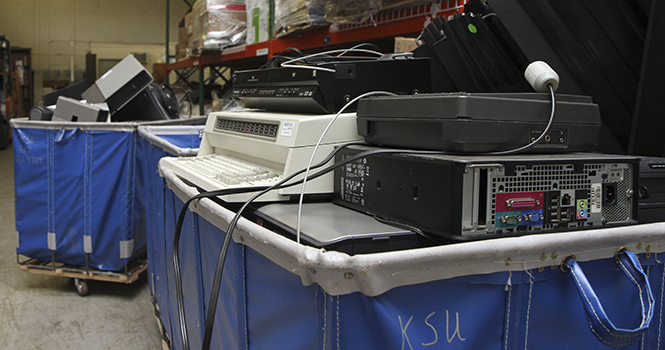Recycling competition makes Kent State students aware of e-waste
Most people know not to throw their electronics in the trash, but figuring out how to get rid of it can be difficult.
When the university upgrades its computers and televisions on campus, old electronics disappear.
Melanie Knowles, sustainability manager in the Department of Facilities Planning and Operations, said any electronics owned by the university get recycled. If another department cannot use a university-owned computer, it gets recycled.
“We work with a recycler and their name is RET3 and they’re located in Cleveland,” Knowles said. “Whenever we have a truck full of e-waste, we call them and they come get it and then we just keep collecting.”
E-waste, or electronic waste, contains many different types of metals that are harmful to the environment. Knowles said she believes that is why it is important to dispose of old electronics properly.
RecycleMania, a competition to recycle as much trash as possible among universities in the U.S. and Canada, began a competition this year called E-cycleMania, which measured how much e-waste a university could collect in a 30-day span.
“The big thing about E-cycleMania is they allowed us to do an e-waste drive that included, not only things that were collected on campus, but also things that were collected from the community,” Knowles said. “So we included that along with what we usually collect from the university.”
Kent State collected more than 11,500 pounds of e-waste during March. Knowles said she was shocked at the response the drive received from the community, which contributed to almost 5,000 pounds of e-waste collected.
But now that E-cycleMania has ended, there isn’t a permanent place on campus for students to recycle their e-waste.
“We talked about having a permanent collection point for e-waste for students, but one of the challenges with that is that even if students think that they’ve erased their [hard drives] or cleared their [phones], there is a chance that there is still personal information that they wouldn’t just want somebody to get,” Knowles said. “So those places where students could drop those things would need to be secured 24/7.”
In order to supply students with a proper way to dispose of their e-waste, Knowles said the university plans on hosting similar drives at least once a semester.
Disposing of e-waste properly is important to Knowles because she said, in the past collection companies have shipped it overseas to developing countries. Those electronics are burned to obtain a small amount of valuable metal. In the process, she said, they release many toxic carcinogens into the environment causing harm to the people in the area.
Julie Mazzei, assistant professor in the Department of Political Science, said a large-scale issue the university faces is that there is no designated way to get rid of e-waste.
“The trash collectors come around to your house and the recycle people come around and they pick up your recyclables and pick up your trash, but there’s no organized state-sponsored way to get rid of e-waste that I know of,” Mazzei said. “So a lot of people have no idea what to do with this stuff other than there’s this vague notion that you shouldn’t put it in a landfill, but nobody really knows.”
Although there is no permanent location on campus to drop off non-working electronics, items that are in working condition can be donated to the university sponsored Throw-N-Go program.
“For on campus students, between spring break and move-out, we have [large bins] in all of the residence halls,” Knowles said. “We have them [in] other places on campus, so it isn’t only for residence hall students.”
The idea is that students can donate their electronics, clothes, nonperishable foods and other miscellaneous items to the Portage County Family and Community Services.
“Just because it isn’t useful to you anymore, doesn’t mean that it doesn’t have use to someone else,” Knowles said. “Even if your computer is broken and you’re not [going to] fix it, if it can get donated someplace where they’re collecting e-waste, there’s a really strong chance that components of that can be used to make a computer for a school or a small non-profit organization.”
Knowles said she hopes that between the drives on campus and other opportunities within the community, people will be able to find a proper place to get rid of their e-waste.
Bryan Webb is the consumer technology reporter for the Daily Kent Stater. Contact him at [email protected].



